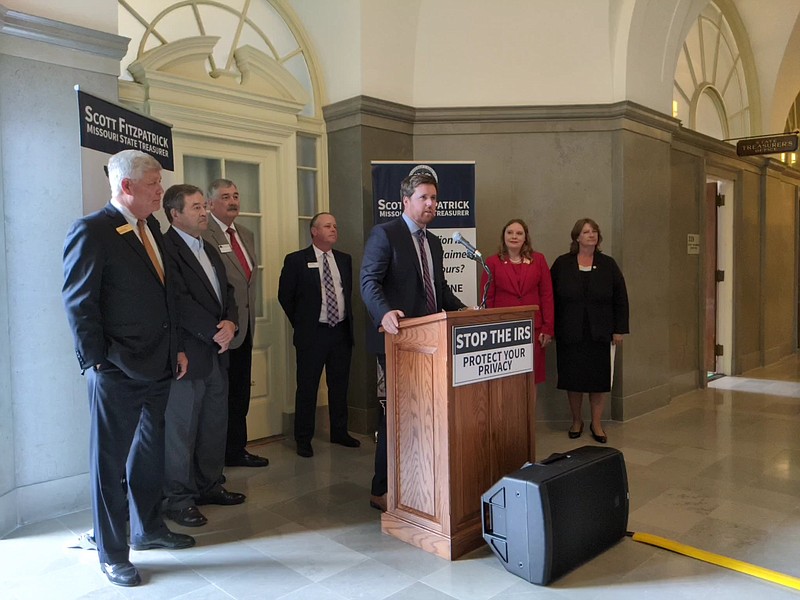State Treasurer Scott Fitzpatrick and several Missouri bankers are standing in opposition to the new IRS reporting proposal, which they said will be too much of a burden.
The proposal, which is still being negotiated in Congress, would require financial institutions to report information of accounts with at least $10,000 in deposits and withdrawals to the Internal Revenue Service each year.
It’s an effort to minimize tax fraud among the nation’s high income individuals, supporters say, and certain wages and federal program income would be exempt, as would some larger purchases, like a down payment on a house.
“What we’re here to say is that we’re opposed to this proposal at any level,” Fitzpatrick said.
Fitzpatrick, along with 23 other state treasurers, auditors and financial officers within the State Financial Officers Foundation, came out against a more restrictive proposal in September.
Congressional Democrats originally proposed a farther reaching plan that would have required banks, credit unions and other financial institutions to provide the IRS annual figures for the amount of money going in and out of accounts with at least $600 in deposits and withdrawals.
The threshold was changed after recent talks between President Joe Biden’s administration and Democrats in Congress.
Fitzpatrick, who is running for state auditor, was joined by several bank and credit union representatives to denounce the new proposal Thursday.
Among the list of reasons they oppose the plan is because they say it would put an unnecessary onus on banks and credit unions.
Legends Bank President John Klebba said financial institutions already turn over a lot of information to the IRS, such as earned interest over $10 and interest paid on a mortgage, but this proposal is too much.
“What we’re talking about here is literally billions of bits of information that we would turn over, which the vast, vast majority of which would have nothing to do with trying to evade taxes,” Klebba said.
Fitzpatrick said the cost community banks and credit unions would incur to remain compliant with the proposal would likely be passed on to consumers.
The carve outs for income and federal program income are also troubling, Fitzpatrick said.
“Frankly, I think to the financial institutions it’s probably more work to try to segregate certain transactions and deposits and determine whether or not those were paychecks or some other source of income, which would further increase the cost of complying with this mandate,” he said.
Klebba said all 10 Legends Bank locations have received feedback that customers are concerned.
“I, frankly, just don’t believe that there’s anybody in the right mind who thinks this is a good idea,” Klebba said.
Additionally, Fitzpatrick said, the reporting requirement could erode trust in banks and would be an invasion of privacy and security risk.
Klebba said the banking industry spends a lot of time and resources working to ensure people trust their finances and information will be secure and the IRS proposal would undermine those efforts.
Earlier this year, tax return information was leaked from the IRS to ProPublica, an investigative news nonprofit, which Fitzpatrick said is concerning.
“I don’t know many people who would want a random federal employee to have access to all their bank account information,” he said.
Fitzpatrick said he also doesn’t understand how the reported account information would result in an increase of tax law enforcement.
The treasurer suggested the IRS focus its efforts on auditing individuals it suspects have committed tax fraud.
If the proposal is signed into law, Fitzpatrick said, he won’t comply and would take the dispute to the United States Supreme Court if necessary.

